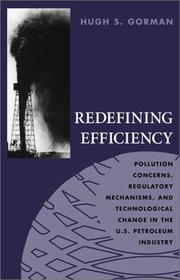| Listing 1 - 3 of 3 |
Sort by
|

ISBN: 1282916564 9786612916564 1935603280 9781935603283 9781935603290 1935603299 1884836747 9781884836749 1884836755 9781884836756 9781282916562 6612916567 Year: 2001 Publisher: Akron Press, Akron, OH University of Akron Press
Abstract | Keywords | Export | Availability | Bookmark
 Loading...
Loading...Choose an application
- Reference Manager
- EndNote
- RefWorks (Direct export to RefWorks)
Pollution control regulations define how complex technological systems interact with natural ecosystems and competing human uses of the environment. This book examines the evolution of this industrial ecology in the United States by tracing numerous pollution concerns associated with the production, transportation, and refining of petroleum.
Pollution --- Environmental protection --- Industrial efficiency --- Petroleum industry and trade --- Law and legislation --- History. --- Environmental aspects
Book
ISBN: 081355439X 9780813554396 9781461934929 1461934923 9781299733350 1299733352 9780813554389 0813554381 Year: 2013 Publisher: New Brunswick, NJ
Abstract | Keywords | Export | Availability | Bookmark
 Loading...
Loading...Choose an application
- Reference Manager
- EndNote
- RefWorks (Direct export to RefWorks)
In The Story of N, Hugh S. Gorman analyzes the notion of sustainability from a fresh perspective-the integration of human activities with the biogeochemical cycling of nitrogen-and provides a supportive alternative to studying sustainability through the lens of climate change and the cycling of carbon. It is the first book to examine the social processes by which industrial societies learned to bypass a fundamental ecological limit and, later, began addressing the resulting concerns by establishing limits of their own. The book is organized into three parts. Part I, "The Knowledge of Nature," explores the emergence of the nitrogen cycle before humans arrived on the scene and the changes that occurred as stationary agricultural societies took root. Part II, "Learning to Bypass an Ecological Limit," examines the role of science and market capitalism in accelerating the pace of innovation, eventually allowing humans to bypass the activity of nitrogen-fixing bacteria. Part III, "Learning to Establish Human-Defined Limits," covers the twentieth-century response to the nitrogen-related concerns that emerged as more nitrogenous compounds flowed into the environment. A concluding chapter, "The Challenge of Sustainability," places the entire story in the context of constructing an ecological economy in which innovations that contribute to sustainable practices are rewarded.
Nature --- Sustainable development. --- Nitrogen cycle. --- Nitrogen --- Anthropogenic effects on nature --- Ecological footprint --- Human beings --- Anthropogenic soils --- Human ecology --- Development, Sustainable --- Ecologically sustainable development --- Economic development, Sustainable --- Economic sustainability --- ESD (Ecologically sustainable development) --- Smart growth --- Sustainable development --- Sustainable economic development --- Economic development --- Biogeochemical cycles --- Group 15 elements --- Nonmetals --- Effect of human beings on. --- Environmental aspects. --- Environmental aspects
Book

ISBN: 1782382534 9781782382539 9781782382522 1782382526 Year: 2014 Publisher: New York Oxford
Abstract | Keywords | Export | Availability | Bookmark
 Loading...
Loading...Choose an application
- Reference Manager
- EndNote
- RefWorks (Direct export to RefWorks)
Information is crucial when it comes to the management of resources. But what if knowledge is incomplete, or biased, or otherwise deficient? How did people define patterns of proper use in the absence of cognitive certainty? Discussing this challenge for a diverse set of resources from fish to rubber, these essays show that deficient knowledge is a far more pervasive challenge in resource history than conventional readings suggest. Furthermore, environmental ignorance does not inevitably shrink with the march of scientific progress: these essays suggest more of a dialectical relationship be
Environmental policy. --- Environmental management. --- Environmental stewardship --- Stewardship, Environmental --- Environmental sciences --- Management --- Environment and state --- Environmental control --- Environmental management --- Environmental protection --- Environmental quality --- State and environment --- Environmental auditing --- Government policy --- Environmental policy --- Environnement --- Politique gouvernementale --- Gestion
| Listing 1 - 3 of 3 |
Sort by
|

 Search
Search Feedback
Feedback About UniCat
About UniCat  Help
Help News
News